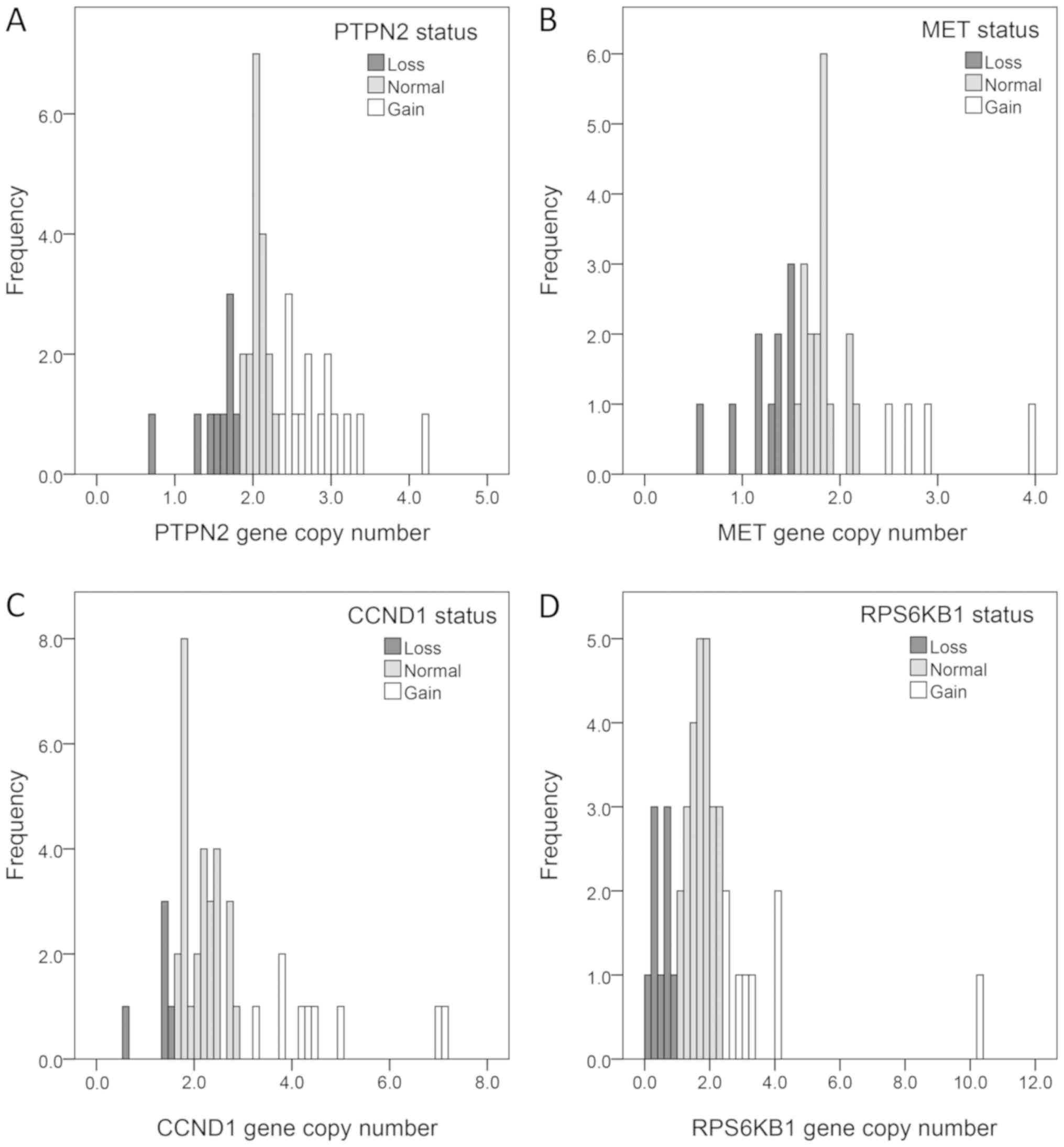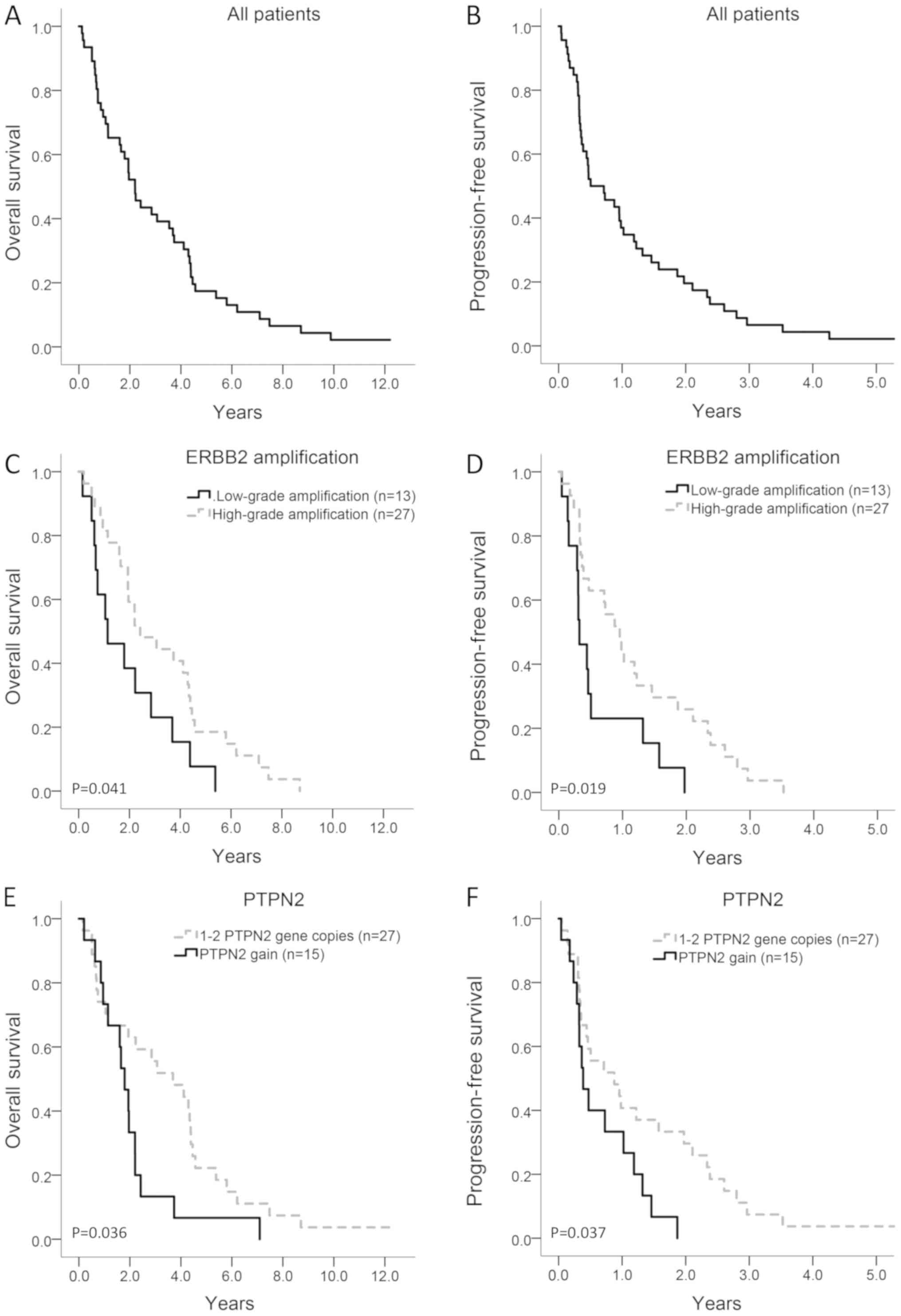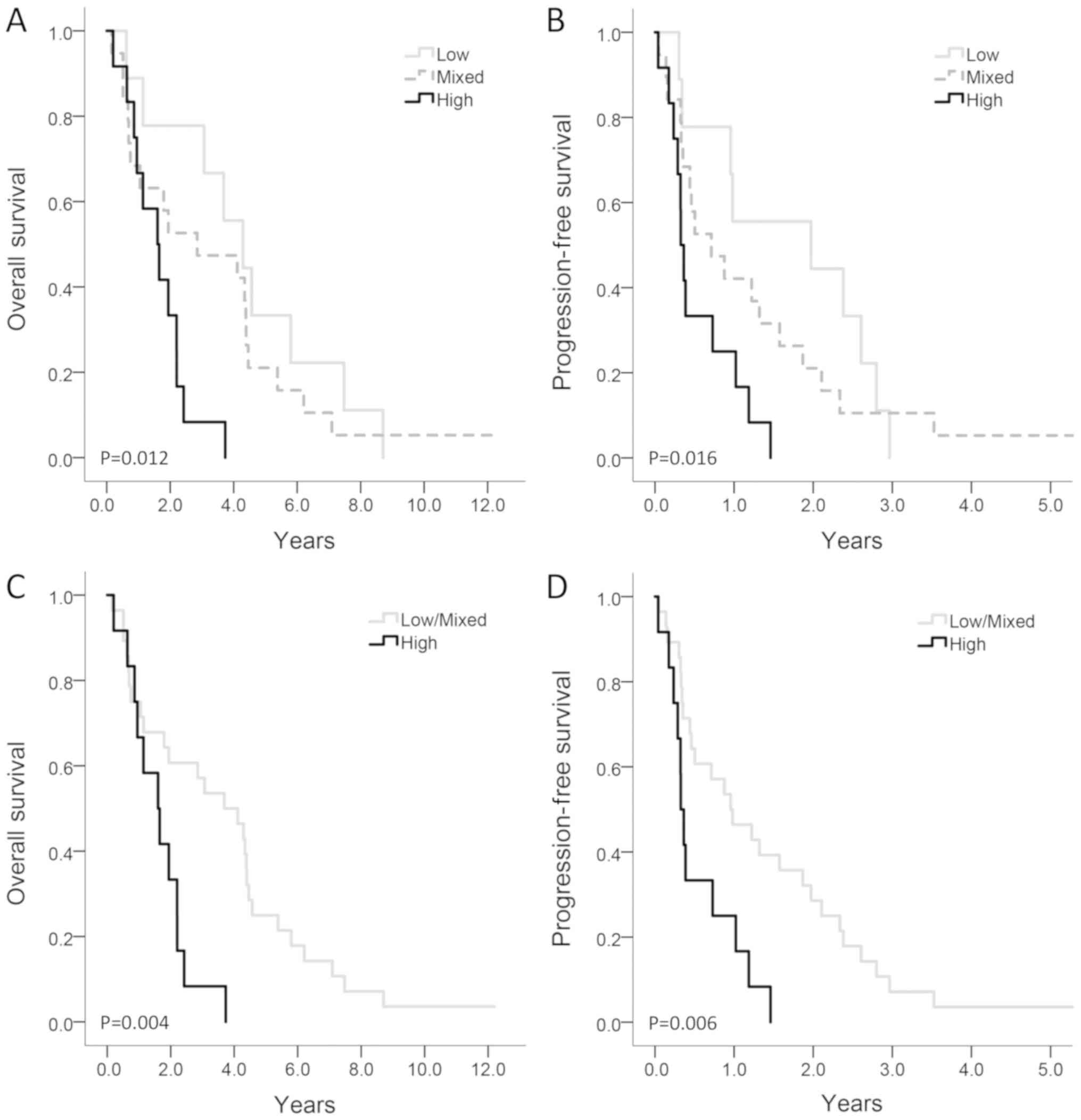|
1
|
Slamon DJ, Godolphin W, Jones LA, Holt JA,
Wong SG, Keith DE, Levin WJ, Stuart SG, Udove J, Ullrich A, et al:
Studies of the HER-2/neu proto-oncogene in human breast and ovarian
cancer. Science. 244:707–712. 1989. View Article : Google Scholar : PubMed/NCBI
|
|
2
|
Dawood S, Broglio K, Buzdar AU, Hortobagyi
GN and Giordano SH: Prognosis of women with metastatic breast
cancer by HER2 status and trastuzumab treatment: An
institutional-based review. J Clin Oncol. 28:92–98. 2010.
View Article : Google Scholar : PubMed/NCBI
|
|
3
|
Olson EM, Najita JS, Sohl J, Arnaout A,
Burstein HJ, Winer EP and Lin NU: Clinical outcomes and treatment
practice patterns of patients with HER2-positive metastatic breast
cancer in the post-trastuzumab era. Breast. 22:525–531. 2013.
View Article : Google Scholar : PubMed/NCBI
|
|
4
|
Balduzzi S, Mantarro S, Guarneri V,
Tagliabue L, Pistotti V, Moja L and D'Amico R:
Trastuzumab-containing regimens for metastatic breast cancer.
Cochrane Database Syst Rev. CD0062422014.PubMed/NCBI
|
|
5
|
Yeo B, Kotsori K, Mohammed K, Walsh G and
Smith IE: Long-term outcome of HER2 positive metastatic breast
cancer patients treated with first-line trastuzumab. Breast.
24:751–757. 2015. View Article : Google Scholar : PubMed/NCBI
|
|
6
|
Yardley DA, Tripathy D, Brufsky AM, Rugo
HS, Kaufman PA, Mayer M, Magidson J, Yoo B, Quah C and Ulcickas
Yood M: Long-term survivor characteristics in HER2-positive
metastatic breast cancer from registHER. Br J Cancer.
110:2756–2764. 2014. View Article : Google Scholar : PubMed/NCBI
|
|
7
|
Murthy P, Kidwell KM, Schott AF, Merajver
SD, Griggs JJ, Smerage JD, Van Poznak CH, Wicha MS, Hayes DF and
Henry NL: Clinical predictors of long-term survival in
HER2-positive metastatic breast cancer. Breast Cancer Res Treat.
155:589–595. 2016. View Article : Google Scholar : PubMed/NCBI
|
|
8
|
Arnould L, Gelly M, Penault-Llorca F,
Benoit L, Bonnetain F, Migeon C, Cabaret V, Fermeaux V, Bertheau P,
Garnier J, et al: Trastuzumab-based treatment of HER2-positive
breast cancer: An antibody-dependent cellular cytotoxicity
mechanism? Br J Cancer. 94:259–267. 2006. View Article : Google Scholar : PubMed/NCBI
|
|
9
|
Vu T and Claret FX: Trastuzumab: Updated
mechanisms of action and resistance in breast cancer. Front Oncol.
2:622012. View Article : Google Scholar : PubMed/NCBI
|
|
10
|
Park YH, Lee SJ, Cho EY, Choi YL, Lee JE,
Nam SJ, Yang JH, Shin JH, Ko EY, Han BK, et al: Clinical relevance
of TNM staging system according to breast cancer subtypes. Ann
Oncol. 22:1554–1560. 2011. View Article : Google Scholar : PubMed/NCBI
|
|
11
|
Holbro T, Beerli RR, Maurer F, Koziczak M,
Barbas CF III and Hynes NE: The ErbB2/ErbB3 heterodimer functions
as an oncogenic unit: ErbB2 requires ErbB3 to drive breast tumor
cell proliferation. Proc Natl Acad Sci USA. 100:8933–8938. 2003.
View Article : Google Scholar : PubMed/NCBI
|
|
12
|
Kurokawa H and Arteaga CL: ErbB (HER)
receptors can abrogate antiestrogen action in human breast cancer
by multiple signaling mechanisms. Clin Cancer Res. 9:511S–515S.
2003.PubMed/NCBI
|
|
13
|
Liu P, Cheng H, Roberts TM and Zhao JJ:
Targeting the phosphoinositide 3-kinase pathway in cancer. Nat Rev
Drug Discov. 8:627–44. 2009. View
Article : Google Scholar : PubMed/NCBI
|
|
14
|
Musgrove EA, Caldon CE, Barraclough J,
Stone A and Sutherland RL: Cyclin D as a therapeutic target in
cancer. Nat Rev Cancer. 11:558–572. 2011. View Article : Google Scholar : PubMed/NCBI
|
|
15
|
Caldon CE, Daly RJ, Sutherland RL and
Musgrove EA: Cell cycle control in breast cancer cells. J Cell
Biochem. 97:261–274. 2006. View Article : Google Scholar : PubMed/NCBI
|
|
16
|
Berns K, Horlings HM, Hennessy BT,
Madiredjo M, Hijmans EM, Beelen K, Linn SC, Gonzalez-Angulo AM,
Stemke-Hale K, Hauptmann M, et al: A functional genetic approach
identifies the PI3K pathway as a major determinant of trastuzumab
resistance in breast cancer. Cancer Cell. 12:395–402. 2007.
View Article : Google Scholar : PubMed/NCBI
|
|
17
|
Luque-Cabal M, Garcia-Teijido P,
Fernandez-Perez Y, Sanchez-Lorenzo L and Palacio-Vazquez I:
Mechanisms behind the resistance to trastuzumab in HER2-amplified
breast cancer and strategies to overcome it. Clin Med Insights
Oncol. 10 (Suppl 1):S21–S30. 2016.
|
|
18
|
Zhang S, Huang WC, Li P, Guo H, Poh SB,
Brady SW, Xiong Y, Tseng LM, Li SH, Ding Z, et al: Combating
trastuzumab resistance by targeting SRC, a common node downstream
of multiple resistance pathways. Nat Med. 17:461–469. 2011.
View Article : Google Scholar : PubMed/NCBI
|
|
19
|
Ha Thi HT, Choi SW, Kim YM, Kim HY and
Hong S: Protein tyrosine phosphatase N2 is a positive regulator of
lipopolysaccharide signaling in Raw264.7 cell through derepression
of Src tyrosine kinase. PLoS One. 11:e01627242016. View Article : Google Scholar : PubMed/NCBI
|
|
20
|
Finn RS: Targeting Src in breast cancer.
Ann Oncol. 19:1379–1386. 2008. View Article : Google Scholar : PubMed/NCBI
|
|
21
|
Soysal S, Obermann EC, Gao F, Oertli D,
Gillanders WE, Viehl CT and Muenst S: PTP1B expression is an
independent positive prognostic factor in human breast cancer.
Breast Cancer Res Treat. 137:637–644. 2013. View Article : Google Scholar : PubMed/NCBI
|
|
22
|
Rivera Franco MM, Leon Rodriguez E,
Martinez Benitez B, Villanueva Rodriguez LG, de la Luz Sevilla
Gonzalez M and Armengol Alonso A: Association of PTP1B with
outcomes of breast cancer patients who underwent neoadjuvant
chemotherapy. Breast Cancer (Auckl). 10:177–184. 2016.PubMed/NCBI
|
|
23
|
Karlsson E, Veenstra C, Emin S, Dutta C,
Pérez-Tenorio G, Nordenskjöld B, Fornander T and Stål O: Loss of
protein tyrosine phosphatase, non-receptor type 2 is associated
with activation of AKT and tamoxifen resistance in breast cancer.
Breast Cancer Res Treat. 153:31–40. 2015. View Article : Google Scholar : PubMed/NCBI
|
|
24
|
Shields BJ, Wiede F, Gurzov EN, Wee K,
Hauser C, Zhu HJ, Molloy TJ, O'Toole SA, Daly RJ, Sutherland RL, et
al: TCPTP regulates SFK and STAT3 signaling and is lost in
triple-negative breast cancers. Mol Cell Biol. 33:557–570. 2013.
View Article : Google Scholar : PubMed/NCBI
|
|
25
|
McShane LM, Altman DG, Sauerbrei W, Taube
SE, Gion M and Clark GM; Statistics Subcommittee of the NCI-EORTC
Working Group on Cancer Diagnostics: Reporting recommendations for
tumor marker prognostic studies (REMARK). J Natl Cancer Inst.
97:1180–1144. 2005. View Article : Google Scholar : PubMed/NCBI
|
|
26
|
Veenstra C, Pérez-Tenorio G, Stelling A,
Karlsson E, Mirwani SM, Nordenskoljd B, Fornander T and Stal O: Met
and its ligand HGF are associated with clinical outcome in breast
cancer. Oncotarget. 7:37145–37159. 2016. View Article : Google Scholar : PubMed/NCBI
|
|
27
|
Bostner J, Karlsson E, Pandiyan MJ,
Westman H, Skoog L, Fornander T, Nordenskjöld B and Stål O:
Activation of Akt, mTOR, and the estrogen receptor as a signature
to predict tamoxifen treatment benefit. Breast Cancer Res Treat.
137:397–406. 2013. View Article : Google Scholar : PubMed/NCBI
|
|
28
|
Karlsson E, Pérez-Tenorio G, Amin R,
Bostner J, Skoog L, Fornander T, Sgroi DC, Nordenskjold B, Hallbeck
AL and Stål O: The mTOR effectors 4EBP1 and S6K2 are frequently
coexpressed and associated with a poor prognosis and endocrine
resistance in breast cancer: A retrospective study including
patients from the randomised Stockholm tamoxifen trials. Breast
Cancer Res. 15:R962013. View Article : Google Scholar : PubMed/NCBI
|
|
29
|
Bostner J, Karlsson E, Eding CB,
Perez-Tenorio G, Franzen H, Konstantinell A, Fornander T,
Nordenskjöld B and Stål O: S6 kinase signaling: Tamoxifen response
and prognostic indication in two breast cancer cohorts. Endocr
Relat Cancer. 22:331–343. 2015. View Article : Google Scholar : PubMed/NCBI
|
|
30
|
Slamon DJ, Leyland-Jones B, Shak S, Fuchs
H, Paton V, Bajamonde A, Fleming T, Eiermann W, Wolter J, Pegram M,
et al: Use of chemotherapy plus a monoclonal antibody against HER2
for metastatic breast cancer that overexpresses HER2. N Engl J Med.
344:783–792. 2001. View Article : Google Scholar : PubMed/NCBI
|
|
31
|
Belgrader P, Tanner SC, Regan JF, Koehler
R, Hindson BJ and Brown AS: Droplet digital PCR measurement of HER2
copy number alteration in formalin-fixed paraffin-embedded breast
carcinoma tissue. Clin Chem. 59:991–994. 2013. View Article : Google Scholar : PubMed/NCBI
|
|
32
|
Heredia NJ, Belgrader P, Wang S, Koehler
R, Regan J, Cosman AM, Saxonov S, Hindson B, Tanner SC, Brown AS
and Karlin-Neumann G: Droplet Digital™ PCR quantitation of HER2
expression in FFPE breast cancer samples. Methods. 59:S20–S23.
2013. View Article : Google Scholar : PubMed/NCBI
|
|
33
|
Otsuji K, Sasaki T, Tanaka A, Kunita A,
Ikemura M, Matsusaka K, Tada K, Fukayama M and Seto Y: Use of
droplet digital PCR for quantitative and automatic analysis of the
HER2 status in breast cancer patients. Breast Cancer Res Treat.
162:11–18. 2017. View Article : Google Scholar : PubMed/NCBI
|
|
34
|
Giuliani R, Durbecq V, Di Leo A, Paesmans
M, Larsimont D, Leroy JY, Borms M, Vindevoghel A, Jerusalem G,
D'Hondt V, et al: Phosphorylated HER-2 tyrosine kinase and
Her-2/neu gene amplification as predictive factors of response to
trastuzumab in patients with HER-2 overexpressing metastatic breast
cancer (MBC). Eur J Cancer. 43:725–735. 2007. View Article : Google Scholar : PubMed/NCBI
|
|
35
|
Xu QQ, Pan B, Wang CJ, Zhou YD, Mao F, Lin
Y, Guan JH, Shen SJ, Zhang XH, Xu YL, et al: HER2 amplification
level is not a prognostic factor for HER2-positive breast cancer
with trastuzumab-based adjuvant treatment: A systematic review and
meta-analysis. Oncotarget. 7:63571–63582. 2016. View Article : Google Scholar : PubMed/NCBI
|
|
36
|
Kim JW, Kim JH, Im SA, Kim YJ, Han HS, Kim
JS, Lee KH, Kim TY, Han SW, Jeon YK, et al: HER2/CEP17 ratio and
HER2 immunohistochemistry predict clinical outcome after first-line
trastuzumab plus taxane chemotherapy in fluorescence in situ
hybridization-positive metastatic breast cancer. Cancer Chemother
Pharmacol. 72:109–115. 2013. View Article : Google Scholar : PubMed/NCBI
|
|
37
|
Carey LA, Berry DA, Cirrincione CT, Barry
WT, Pitcher BN, Harris LN, Ollila DW, Krop IE, Henry NL, Weckstein
DJ, et al: Molecular heterogeneity and response to neoadjuvant
human epidermal growth factor receptor 2 targeting in CALGB 40601,
a randomized phase III trial of paclitaxel plus trastuzumab with or
without lapatinib. J Clin Oncol. 34:542–549. 2016. View Article : Google Scholar : PubMed/NCBI
|
|
38
|
Fumagalli D, Venet D, Ignatiadis M, Azim
HA Jr, Maetens M, Rothé F, Salgado R, Bradbury I, Pusztai L,
Harbeck N, et al: RNA sequencing to predict response to neoadjuvant
anti-HER2 therapy: A secondary analysis of the NeoALTTO randomized
clinical trial. JAMA Oncol. Sep 29–2016.(Epub ahead of print).
PubMed/NCBI
|
|
39
|
Manguso RT, Pope HW, Zimmer MD, Brown FD,
Yates KB, Miller BC, Collins NB, Bi K, LaFleur MW, Juneja VR, et
al: In vivo CRISPR screening identifies Ptpn2 as a cancer
immunotherapy target. Nature. 547:413–418. 2017. View Article : Google Scholar : PubMed/NCBI
|
|
40
|
Nagata Y, Lan KH, Zhou X, Tan M, Esteva
FJ, Sahin AA, Klos KS, Li P, Monia BP, Nguyen NT, et al: PTEN
activation contributes to tumor inhibition by trastuzumab, and loss
of PTEN predicts trastuzumab resistance in patients. Cancer Cell.
6:117–127. 2004. View Article : Google Scholar : PubMed/NCBI
|
|
41
|
Park YH, Jung HA, Choi MK, Chang W, Choi
YL, Do IG, Ahn JS and Im YH: Role of HER3 expression and PTEN loss
in patients with HER2-overexpressing metastatic breast cancer (MBC)
who received taxane plus trastuzumab treatment. Br J Cancer.
110:384–391. 2014. View Article : Google Scholar : PubMed/NCBI
|
|
42
|
Perez EA, Cortés J, Gonzalez-Angulo AM and
Bartlett JM: HER2 testing: Current status and future directions.
Cancer Treat Rev. 40:276–284. 2014. View Article : Google Scholar : PubMed/NCBI
|
|
43
|
Geyer CE, Forster J, Lindquist D, Chan S,
Romieu CG, Pienkowski T, Jagiello-Gruszfeld A, Crown J, Chan A,
Kaufman B, et al: Lapatinib plus capecitabine for HER2-positive
advanced breast cancer. N Engl J Med. 355:2733–2743. 2006.
View Article : Google Scholar : PubMed/NCBI
|

















